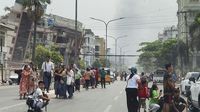On Friday, March 28, 2025, a magnitude 7.7 earthquake struck Myanmar, prompting the military junta to request international assistance and declare a state of emergency across six affected regions. This rare plea for help from the junta comes as the nation grapples with the aftermath of one of the most devastating natural disasters in recent history.
Junta leader Min Aung Hlaing was seen visiting a hospital in Naypyidaw shortly after the earthquake, where many of the injured were being treated. His presence at the hospital underscored the gravity of the situation as he monitored the conditions of the victims.
In the wake of the earthquake, Bangkok, Thailand, was also declared a disaster area. The tremors were felt strongly across the border, leading to significant structural damage, including the collapse of a 30-story building that was still under construction. Emergency teams in Bangkok are currently working tirelessly to rescue approximately 67 individuals believed to be trapped in the rubble.
As rescue operations continue, the World Health Organization (WHO) has mobilized its logistics center in Dubai to prepare for the delivery of much-needed aid to Myanmar. According to WHO spokesperson Margaret Harris, the conditions resulting from the earthquake pose a significant threat to life and health. "We have activated our logistics center to seek supplies and items such as external fixators because we anticipate many injuries that will need to be addressed," Harris stated.
Harris emphasized the urgency of the situation, noting that WHO is also focusing on preparing essential medications amidst the challenges posed by Myanmar's damaged health infrastructure. "We are ready to move. But right now, we need to know exactly where, what, and why. Information from the field is crucial at this moment," she added.
The junta's spokesperson, Zaw Min Tun, reiterated the call for humanitarian assistance from the international community, stating, "We want the international community to provide humanitarian aid as soon as possible." He made this appeal while accompanying Min Aung Hlaing on his hospital visit, highlighting the dire need for support.
In addition to the urgent call for aid, Zaw Min Tun also mentioned a critical need for blood donations for patients in Mandalay, Naypyidaw, and Sagaing, as the healthcare system struggles to cope with the influx of casualties.
As of the latest reports, General Min Aung Hlaing announced that the death toll from the earthquake has tragically reached 144, with over 730 individuals injured. These numbers are expected to rise as rescue efforts continue and more information becomes available.
In the aftermath of the earthquake, both Myanmar and Thailand are working diligently to address the immediate needs of those affected. The international community's response will be pivotal in mitigating the impact of this disaster and providing necessary support to the victims.
The situation remains fluid, and authorities in both countries are closely monitoring developments. As rescue operations unfold, the hope is that more lives can be saved and that aid will reach those in desperate need.
As the world watches, the unity and resilience of the affected communities will be tested in the days to come. The road to recovery will be long, but with international support and local determination, there is hope for rebuilding and healing.




